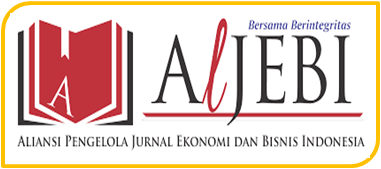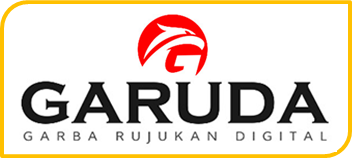Exploring Contributing Factors to Environmental Disclosures in Islamic Commercial Banks of Indonesia
Abstract
Keywords
Full Text:
PDFReferences
Abdelzaher, D. M., Kotb, A., & Helfaya, A. (2019). Eco-Islam: Beyond the Principles of Why and What, and Into the Principles of How. Journal of Business Ethics, 155(3), 623–643. https://doi.org/10.1007/s10551-017-3518-2 Ahmad, F., Zayed, N.M., & Harun, M.A. (2013). Factors Behind the Adoption of Green Banking in Commercial Banks 243 Literature Review. Bae, K.-H., Kang, J.-K., & Wang, J. (2011). Employee treatment and firm leverage: A test of the stakeholder theory of capital structure. Journal of Financial Economics, 100(1), 130–153. https://doi.org/10.1016/j.jfineco.2010.10.019 Bagus, P., Gabriel, A., & Howden, D. (2016). Reassessing the Ethicality of Some Common Financial Practices. Journal of Business Ethics, 136(3), 471–480. https://doi.org/10.1007/s10551-014-2525-9 Birindelli, G., & Palea, V. (2023). To green or not to green? How CSR mechanisms at the governance level affect the likelihood of banks pursuing green product strategies. Corporate Governance: The International Journal of Business in Society, 23(1), 219–242. https://doi.org/10.1108/CG-09-2021-0349 Bose, S., Khan, H. Z., Rashid, A., & Islam, S. (2018). What drives green banking disclosure? An institutional and corporate governance perspective. Asia Pacific Journal of Management, 35(2), 501–527. https://doi.org/10.1007/s10490-017-9528-x Bukhari, S. A. A., Hashim, F., Amran, A. B., & Hyder, K. (2019). Green Banking and Islam: Two sides of the same coin. Journal of Islamic Marketing, 11(4), 977–1000. https://doi.org/10.1108/JIMA-09-2018-0154 De Villiers, C., Naiker, V., & Van Staden, C. J. (2011). The Effect of Board Characteristics on Firm Environmental Performance. Journal of Management, 37(6), 1636–1663. https://doi.org/10.1177/0149206311411506 DiMaggio, P. J., & Powell, W. W. (1983). The Iron Cage Revisited: Institutional Isomorphism and Collective Rationality in Organizational Fields. American Sociological Review, 48(2), 147. https://doi.org/10.2307/2095101 Fahmi, I. (2017). Analisis Laporan Keuangan. Bandung: Alfabeta Fatemi, A., Glaum, M., & Kaiser, S. (2018). ESG performance and firm value: The moderating role of disclosure. Global Finance Journal, 38, 45–64. https://doi.org/10.1016/j.gfj.2017.03.001 Fatonah, S., Studi, P., Manajemen, M., Studi, P., & Manajemen, M. (2017). Faktor-faktor yang mempengaruhi pelaksanaan green banking. Seminar Nasional Teknologi Informasi dan Bisnis (SENATIB), 333–338. Ghozali, I. and Chariri, A. (2014). International Accounting Theory Financial Reports (IFRS) Issue 4. Semarang: Diponegoro University Publishers Agency Grassa, R., El-Halaby, S., & Hussainey, K. (2019). Chapter 13 Corporate Governance and Multi-corporate Disclosures Evidence from Islamic Banks. In T. Azid, A. A. Alnodel, & M. A. Qureshi (Eds.), Research in Corporate and Shari’ah Governance in the Muslim World: Theory and Practice (pp. 167–187). Emerald Publishing Limited. https://doi.org/10.1108/978-1-78973-007-420191014 Handajani, L. (2019). Corporate Governance dan Green Banking Disclosure: Studi pada Bank di Indonesia. Jurnal Dinamika Akuntansi dan Bisnis, 6(2), 121–136. https://doi.org/10.24815/jdab.v6i2.12243 Hanif. Ningsih, N. W., & Iqbal, F. (2020). Green Banking Terhadap Profitabilitas Bank Umum Syariah di Indonesia. FIDUSIA: Jurnal Ilmu Keuangan dan Perbankan, 3(2), 86-99. Harjoto, M. A. (2017). Corporate social responsibility and degrees of operating and financial leverage. Review of Quantitative Finance and Accounting, 49(2), 487–513. https://doi.org/10.1007/s11156-016-0598-5 Henderson, R. M., Reinert, S. A., Dekhtyar, P., & Migdal, A. (2017). Climate Change in 2017: Implications for Business. Hussain, A., Khan, M., Rehman, A., Sahib Zada, S., Malik, S., Khattak, A., & Khan, H. (2021). Determinants of Islamic social reporting in Islamic banks of Pakistan. International Journal of Law and Management, 63(1), 1–15. https://doi.org/10.1108/IJLMA-02-2020-0060 IFC. (2015). Greening the banking system - experiences from the sustainable banking network (SBN). Julia, T., & Kassim, S. (2020). Exploring green banking performance of Islamic banks vs conventional banks in Bangladesh based on Maqasid Shariah framework. Journal of Islamic Marketing, 11(3), 729–744. https://doi.org/10.1108/JIMA-10-2017-0105 Julia, T., Rahman, M. P., & Kassim, S. (2016). Shariah compliance of green banking policy in Bangladesh. Humanomics, 32(4), 390–404. https://doi.org/10.1108/H-02-2016-0015 Kawabata, T. (2019). What are the determinants for financial institutions to mobilise climate finance? Journal of Sustainable Finance & Investment, 9(4), 263–281. https://doi.org/10.1080/20430795.2019.1611148 Kasmir. (2016). Analisis Laporan Keuangan. Jakarta: Raja Grafindo Persada. Katadata.co.id. (2022). The Bank with the Strongest 'Green Banking' Image, Who's the Champion? Accessed on 14 April 2023, from https://databoks.katadata.co.id/datapublish/2022/06/07/bank-dengan-citra-green-banking-terkuat-siapa-juaranya Khan, B.F. (2017), Governance for Green Growth in Bangladesh: Policies, Institutions and Political Economy. London: Adam Smith International Laguir, I., Marais, M., El Baz, J., & Stekelorum, R. (2018). Reversing the business rationale for environmental commitment in banking: Does financial performance lead to higher environmental performance? Management Decision, 56(2), 358–375. https://doi.org/10.1108/MD-12-2016-0890 Lako, Andreas. (2014). Green Economy. Semarang: PT. Gelora Aksara Pratama Maryatun, Triyana. (2017). The Effect of Corporate Social Responsibility Disclosure, Firm Size, Financial Leverage, Profit Management on the Cost of Equity. 11–27. Merina, C. I., & Noviardy, A. (2015). Determinant Analysis of Corporate Social Responsibility (CSR) Disclosures of Go Public Companies in Indonesia. Bina Darma E-Journal. Meyer, J. W., & Rowan, B. (1977). Institutionalized organizations: Formal structure as myth and ceremony. American Journal of Sociology, 83(2): 340–363. Mir, A. A., & Bhat, A. A. (2022). Green banking and sustainability – a review. Arab Gulf Journal of Scientific Research, 40(3), 247–263. https://doi.org/10.1108/AGJSR-04-2022-0017 Mishra, S., & Modi, S. B. (2013). Positive and Negative Corporate Social Responsibility, Financial Leverage, and Idiosyncratic Risk. 431–448. https://doi.org/10.1007/s10551-012-1526-9 Murdiansyah, I. (2021). Leverage, Size of the Board of Commissioners, Size of the Sharia Supervisory Board and Its Effect on Disclosure of Islamic Social Reporting (ISR) 2015-2018. 5(1), 43–56. Ningrum, R., Fachrurrozie, F., & Jayanto, P. (1). The Influence of Financial Performance, Institutional Ownership and Size of the Sharia Supervisory Board on ISR Disclosure. Accounting Analysis Journal, 2(4). https://doi.org/10.15294/aaj.v2i4.4169 Nouh, M. (2016). Sustainable development in a Muslim context. Nurrahmawati, A., Rahmawati, W., Perwitasari, W., & Kurniawati, E.M. (2021). CSR reporting levels and financial quality: comparative analysis in Indonesian sharia and conventional banking. Forum Ekonomi, 23(2), 231–240. Oyegunle, A., & Weber, O. (2015). Development of Sustainability and Green Banking Regulations: Existing Codes and Practices. Canada: Centre for International Governance Innovation. Prado-Lorenzo, J. M., & García-Sánchez, I. M. (2010). The role of the board of directors in disseminating relevant information on greenhouse gases. Journal of Business Ethics, 97(3): 391–424. Qian, W. and Schaltegger, S. (2017). Revisiting carbon disclosure and performance: legitimacy and management views. The British Accounting Review, 49(4), 365-379. doi: 10.1016/j. bar.2017.05.005 Rahman, S. A., Yusoff, R. b., Mohamed, W. N. (2009). Environmental disclosure and financial performance: An empirical study of Malaysia, Thailand and Singapore. Social and Environmental Accountability Journal, 29(2), 46–58. Saha, A. K. (2019). Relationship between corporate social responsibility performance and disclosures: commercial banks of Bangladesh. Social Responsibility Journal, 15(4), 451–468. https://doi.org/10.1108/SRJ-07-2017-0137 Sharmeen, K., & Yeaman, A. M. (2020). Benefits That Islamic and Conventional Banks Can Attain by Implementing Green Banking. Journal of Islamic Monetary Economics and Finance, 6(4), 833–860. https://doi.org/10.21098/jimf.v6i4.1134 Singh, N. B., & Basu, M. S. (2004). Groundnut research in India: An overview. In M. S. Basu & N. B. Singh (Eds.), Groundnut research in India, (pp. 1–6). Junagadh, Gujarat, India: National Research Center for Groundnut (ICAR) United Nations. (2016, April). Sustainable development goals, Lists of Parties that Signed the Paris Agreement. www.un.org/sustainabledevelopment/blog/2016/04/ parisagreementsingatures/ United Nations. (2022, April). UN climate report: It’s ‘now or never’ to limit global warming to 1.5 degrees. https://news.un.org/en/story/2022/04/1115452/ (accessed 3 March 2023) Wickert, C., Scherer, A. G., & Spence, L. (2016). Walking and talking corporate social responsibility: Implications of firm size and organizational cost. Journal of Management Studies, 53(7), 1169–1196 Yassin, M., & Ali, S. A. (2020). Survival of new institutional sociology theory: The case of environmental management accounting in the Egyptian context. International Journal of Customer Relationship Marketing and Management, 11(1), 50–63. https://doi.org/10.4018/IJCRMM.2020010104 Younis, H., & Sundarakani, B. (2020). The impact of firm size, firm age and environmental management certification on the relationship between green supply chain practices and corporate performance. Benchmarking, 27(1), 319–346. https://doi.org/10.1108/BIJ-11-2018-0363
DOI: https://doi.org/10.18860/miec.v3i2.23818
Refbacks
- There are currently no refbacks.

This work is licensed under a Creative Commons Attribution-ShareAlike 4.0 International License.
Editorial Office:
Megawati Soekarnoputri Building
Faculty of Economics
Jln. Gajayana 50 Telp (0341) 558881
E-mail: m-iecjournal@uin-malang.ac.id
UIN Maulana Malik Ibrahim Malang
Member of:
Indexed by:
Maliki Islamic Economics Journal under a CC BY SA 4.0 International License.
View My Stats


























